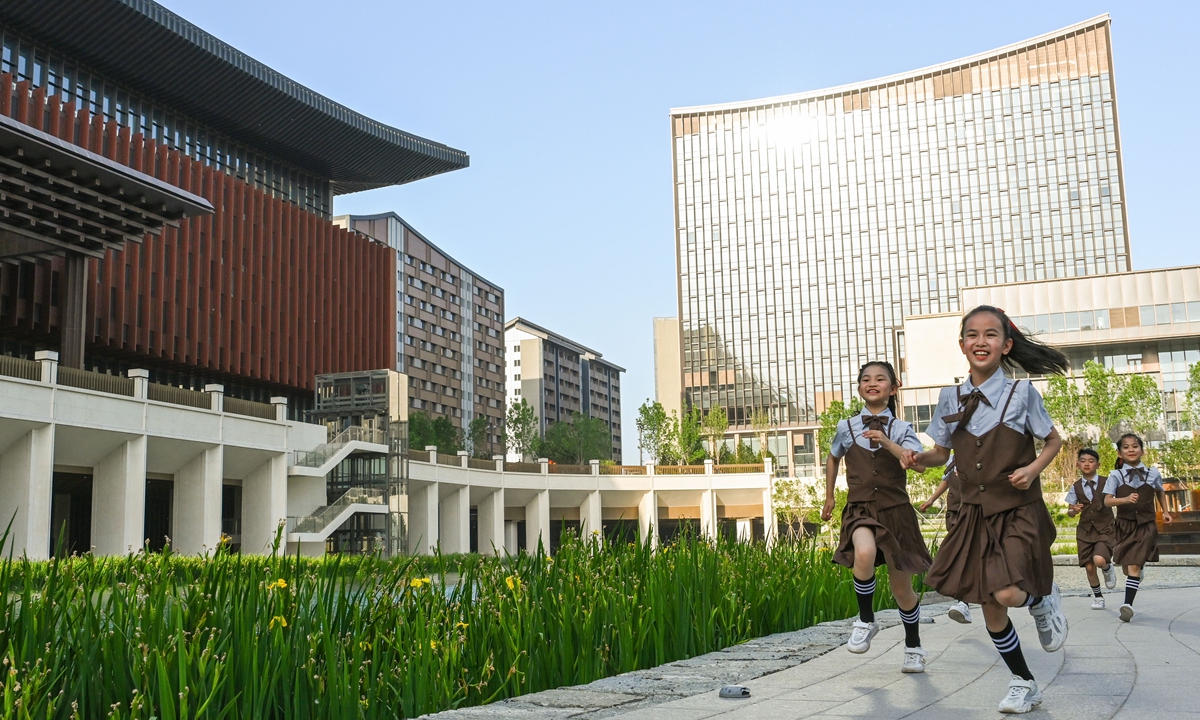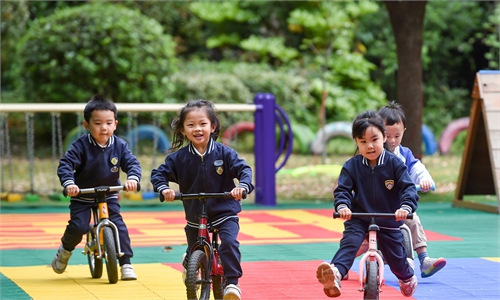
Children run in front of the business and service convention center in Xiong'an on May 15. Photo: Chen Tao/GT
Senior Chinese demographers have called for local governments to strengthen their policies on supporting families, even if they only have one child, to boost fertility rates, as some local regions focused their policies on rewarding families with two or three children but ignored building a fertility-friendly society.He Dan, director of the China Population and Development Research Center, published an article in the latest issue of the Population and Health, a journal sponsored by the center, and pointed out the importance of supporting one-child families.
The expert said that the delaying of the birth of the first child is the main reason for the lower fertility level.
He cited official data as saying that China's total fertility rate dropped from 1.52 in 2019 to 1.07 in 2022. The fertility rate of one-child families fell from 0.7 to 0.5. Mothers' average age at which the first child was born rose from 26.4 years to 27.4. The number of families able and willing to have a first child decreased.
The decline in the birth rate of one-child families will further reduce the birth rate of those with two and three children, and exacerbate the downward trend of fertility levels, He noted.
He revealed that poor child-rearing experience is the main factor affecting families' further births. Data from a survey on the status of marriage and childbirth in China show that most mothers with one child feel uneasy about preparing for pregnancy and childbirth.
He believes that this is not only related to the family's insufficient ability to bear the cost of childbearing, rearing and education, but also the poor experience of the family's first birth and rearing process.
The expert pointed out that the weak support for one-child families shows some local governments' lack of understanding of the national policy. The central government's decision to optimize the fertility policy to promote long-term balanced population development has been simply understood by some localities as the "second- or third-child policy," ignoring the fundamental goal of building a fertility support system.
For example, some cities give one-off subsidies of 5,000 yuan ($706.6) and 20,000 yuan respectively to local families for having a second or a third child, while families with one child are not eligible for the policy, according to He.
He believes these policies may not only fail to improve fertility intentions, but also lead to policy fragmentation and inequality among families, which is inconsistent with the overall goal of promoting people-oriented urbanization and equal access to basic public services.
Therefore, He suggested abolishing differences in the number of children families have and restrictions on household registration, and upholding a fair, inclusive and friendly approach to fertility support.
The expert stressed that localities should avoid differentiated and progressive support policies. Instead, localities should focus on improving couples' experience in the process of first birth and rearing, and improving the sense of gain and willingness of families to have more children.
Zhai Zhenwu, president of the China Population Association, also head of the Population Development Studies Center at Renmin University of China, holds similar views. Zhai told the Global Times on Tuesday that the optimized national child-bearing policy aims to provide better protection for women, rather than haggling over having one or more children.
Instead of being utilitarian in support policies, localities should focus on reducing the burden on women of childbearing age and trying to improve the life satisfaction of families, so as to build a fertility-friendly society.



